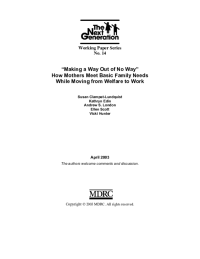"Making A Way Out of No Way"
How Mothers Meet Basic Family Needs While Moving from Welfare to Work
Summary of Key Findings from Working Paper No. 14
Background
Even as the 1996 Personal Responsibility and Work Opportunity Reconciliation Act (PRWORA) increased expectations of employment for welfare recipients, the authors of the new federal law were aware that employment alone would often fail to provide enough income to meet basic family needs. Accordingly, PRWORA mandated that state welfare programs ensure transitional child care, food stamps, and Medicaid to those leaving welfare for low-wage work. But it is one thing to have these provisions on the books and another to successfully deliver them to the families who need them. Data from a three- to four-year, in-depth, qualitative study of families in Cleveland and Philadelphia are used to tell the story — from the viewpoint of families — of how respondents struggled to meet basic needs when they transitioned from welfare to employment.
Key Findings
- By the end of the study period, respondents who worked reported significant gains in average income (net of work-related expenses) than those who were not working.
- Families faced enormous challenges securing the public work-based benefits to which they were entitled. Parents who sought to apply and maintaining eligibility for child care assistance and other subsidies were required to surmount daunting bureaucratic hurdles, and many families’ food stamp and Medicaid cases were closed incorrectly during the course of the study. The level of “hassle” experienced by families varied, indicating that small changes in fine-level details of implementation could make a large difference in the ability of working mothers to access and retain transitional benefits.
- Families’ private support systems, such as child care provided by family members and local food pantries that supplied emergency food rations, were highly variable in their capacity to help respondents meet their children’s basic needs.
Conclusion
This paper sharply delineates how difficult it is for families who struggle to find stable employment to receive the transitional benefits to which they are entitled. Families’ ability to secure child care, food, and health care resources depended on how programs were implemented; having detailed knowledge of the benefits the welfare office is supposed to provide; the cooperation of a competent, well-trained caseworker; a family situation that allowed the family to take up these benefits in the form the welfare department provided them; and, too often, just plain luck.







